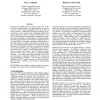Free Online Productivity Tools
i2Speak
i2Symbol
i2OCR
iTex2Img
iWeb2Print
iWeb2Shot
i2Type
iPdf2Split
iPdf2Merge
i2Bopomofo
i2Arabic
i2Style
i2Image
i2PDF
iLatex2Rtf
Sci2ools
150
click to vote
FTCS
1998
1998
Improving Software Robustness with Dependability Cases
Programs fail mainly for two reasons: logic errors in the code, and exception failures. Exception failures can account for up to 2/3 of system crashes [6], hence are worthy of serious attention. Traditional approaches to reducing exception failures, such as code reviews, walkthroughs and formal testing, while very useful, are limited in their ability to address a core problem: the programmer's inadequate coverage of exceptional conditions. The problem of coverage might be rooted in cognitive factors that impede the mental generation (or recollection) of exception cases that would pertain in a particular situation, resulting in insufficient software robustness. This paper describes a study to test the hypothesis that robustness for exception failures can be improved through the use of dependability cases. Dependability cases, derived from safety cases, comprise a methodology based on structured taxonomies and memory aids for helping software designers think about and improve excep...
Related Content
| Added | 01 Nov 2010 |
| Updated | 01 Nov 2010 |
| Type | Conference |
| Year | 1998 |
| Where | FTCS |
| Authors | Roy A. Maxion, Robert T. Olszewski |
Comments (0)

